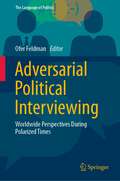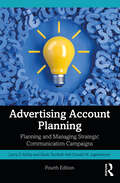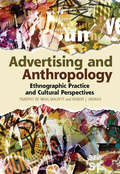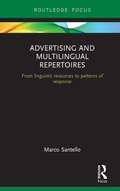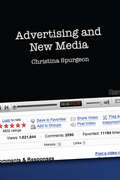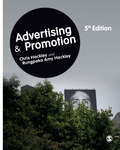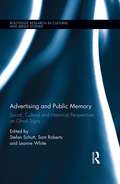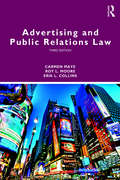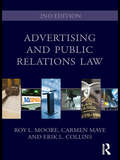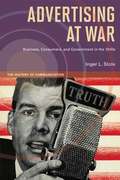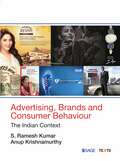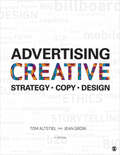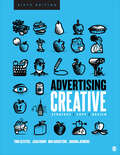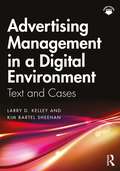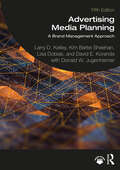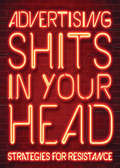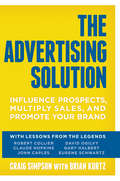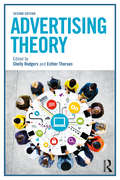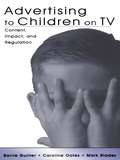- Table View
- List View
Adversarial Political Interviewing: Worldwide Perspectives During Polarized Times (The Language of Politics)
by Ofer FeldmanThis book presents a collection of studies on political interviews in a variety of broadcast media worldwide. Following the growing scholarly interest in media talk as a dominant form of political communication in contemporary society, a number of eminent international scholars analyze empirical material from the discourse of public figures and interviewer–journalists to address questions related to the characteristics, conduct, and potential effects of political interviews. Chapters span a varied array of cultural contexts: the U.S.A., U.K., Israel, Japan, Italy, Turkey, Greece, Australia, Philippines, Finland, Brazil, Malaysia, Spain, Venezuela, Montenegro, and the European Community, enabling a comparison of the different structures and contents of political interviews in societies from West to East. Authors bring an interest in discourse and conversation analysis, as well as in rhetorical techniques and strategies used by both interviewers and interviewees, from different disciplinary viewpoints including linguistic, political, cultural, sociological, and social–psychological. In doing so, the book develops a framework to assess the extent to which media political interviews and talk shows, and regular news programs, play a central role in transmitting accurate and genuine political information to the general public, and how audiences can make sense of these programs’ output.
Advertising Account Planning: Planning and Managing Strategic Communication Campaigns
by Sarah Turnbull Larry Kelley Donald JugenheimerThis practical and comprehensive text effectively provides advertising account planning principles within an integrated marketing communications framework. With a world-renowned textbook author team, this 4th edition has been fully updated to include: Fresh professional examples and mini-case studies within each chapter with a more global outlook than previous editions, bringing the theoretical concepts to life A new chapter on International Advertising addressing the challenges of managing a global campaign Pedagogical features and visual aids to support student learning and comprehension, including reflective questions and mini-cases drawn from current industry examples New and expanded content covering digital marketing and technologies; the customer journey; ethics and corporate social responsibility; global positioning of the brand; paid, earned and owned media; influencer marketing, and campaign measurement and analytics. Providing a full understanding of the advertising account planning process, this textbook is perfect for both the industry and classroom. The textbook will equip students of Marketing Communications, Advertising Management and Brand Management with the knowledge and skills they need to plan and manage a strategic communications campaign, including prominent advertising student competitions such as American Advertising Federation ( AAF) National Student Advertising Competition ( NSAC) or the Collegiate EFFIES. Online resources include PowerPoint slides and a test bank.
Advertising and Anthropology: Ethnographic Practice and Cultural Perspectives
by Robert J. Morais Timothy de Waal MalefytExamining theory and practice, Advertising and Anthropology is a lively and important contribution to the study of organizational culture, consumption practices, marketing to consumers and the production of creativity in corporate settings. The chapters reflect the authors' extensive lived experienced as professionals in the advertising business and marketing research industry. Essays analyze internal agency and client meetings, competitive pressures and professional relationships and include multiple case studies. The authors describe the structure, function and process of advertising agency work, the mediation and formation of creativity, the centrality of human interactions in agency work, the production of consumer insights and industry ethics. Throughout the book, the authors offer concrete advice for practitioners.Advertising and Anthropology is written by anthropologists for anthropologists as well as students and scholars interested in advertising and related industries such as marketing, marketing research and design.
Advertising and Multilingual Repertoires: from Linguistic Resources to Patterns of Response (Routledge Focus on Linguistics)
by Marco SantelloAdvertising and Multilingual Repertoires explores advertising from the perspective of multilingual audiences. Santello introduces the key linguistic processes involved in advertising discourse, and analyses the relationship between the linguistic repertoires of audiences and language use in advertising. This book: Showcases the most recent advancements in linguistic research as applied to the study of advertising and multilingualism, adopting an approach that focuses on linguistic resources; Examines how advertisements make use of language(s), including Italian and the use of English as a foreign language, in order to attract attention and persuade their audience; Familiarises readers with response mechanisms that bilinguals and multilinguals experience when exposed to advertising in different languages; Demonstrates both qualitative and quantitative approaches to researching the intersections between language and marketing. Advertising and Multilingual Repertoires is key reading for postgraduate students and researchers in the field of language and advertising.
Advertising and New Media
by Christina SpurgeonThis comprehensive introduction explores the evolving relationship between new media, advertising and new media consumers. Tracing the shift from 'mass' to 'my' media, Advertising and New Media critically evaluates the social and cultural implications of increased interactivity and consumer creativity for the future of advertising, with examples drawn from the USA, the UK, Europe, Australia and the peoples Republic of China.Features include: evaluation of consumer-generated advertising, including the Coke Mentos phenomenon, and comparative analysis of the Dove ‘Real Beauty’ and Axe/Lynx ‘Effect’ campaigns interviews with industry practitioners, providing first-hand insights on the impact of new media on advertising.
Advertising and Promotion
by Chris Hackley Rungpaka Amy HackleyNow in its fifth edition, this popular textbook continues to provide a comprehensive insight into the world of advertising and promotional communications. Unique in its approach, the authors situate the key concepts of marketing communications from the perspective of advertising agencies and provide insight into what a career within an ad agency might be like. Their critical approach grounded in up-to-date research allows the reader to develop an interdisciplinary understanding of marketing and advertising, including business, socio-cultural, media studies and consumer culture theory perspectives. Along with striking full colour visual advertisements and illustrations, new examples and case studies, this fifth edition has been fully updated to include: Two brand new chapters on Social Media Advertising and Digital Advertising Commentary on how the COVID-19 pandemic has and will impact advertising The evolving role of advertising agencies in the post digital era Emerging forms of advertising and promotion, including the role of influencers
Advertising and Promotion
by Chris Hackley Rungpaka Amy HackleyNow in its fifth edition, this popular textbook continues to provide a comprehensive insight into the world of advertising and promotional communications. Unique in its approach, the authors situate the key concepts of marketing communications from the perspective of advertising agencies and provide insight into what a career within an ad agency might be like. Their critical approach grounded in up-to-date research allows the reader to develop an interdisciplinary understanding of marketing and advertising, including business, socio-cultural, media studies and consumer culture theory perspectives. Along with striking full colour visual advertisements and illustrations, new examples and case studies, this fifth edition has been fully updated to include: Two brand new chapters on Social Media Advertising and Digital Advertising Commentary on how the COVID-19 pandemic has and will impact advertising The evolving role of advertising agencies in the post digital era Emerging forms of advertising and promotion, including the role of influencers
Advertising and Public Memory: Social, Cultural and Historical Perspectives on Ghost Signs (Routledge Research in Cultural and Media Studies)
by Stefan Schutt Sam Roberts Leanne WhiteThis is the first scholarly collection to examine the social and cultural aspects on the worldwide interest in the faded remains of advertising signage (popularly known as ‘ghost signs’). Contributors to this volume examine the complex relationships between the signs and those who commissioned them, painted them, viewed them and view them today. Topics covered include cultural memory, urban change, modernity and belonging, local history and place-making, the crowd-sourced use of online mobile and social media to document and share digital artefacts, ‘retro’ design and the resurgence in interest in the handmade. The book is international and interdisciplinary, combining academic analysis and critical input from practitioners and researchers in areas such as cultural studies, destination marketing, heritage advertising, design, social history and commercial archaeology.
Advertising and Public Relations Law (Routledge Communication Series)
by Carmen Maye Roy L. Moore Erik L. CollinsAddressing a critical need, Advertising and Public Relations Law explores the issues and ideas that affect the regulation of advertising and public relations speech, some of the most dynamic and prevalent areas of professional communications today. This updated third edition explores the categorization of different kinds of speech and their varying levels of First Amendment protection as well as common areas of litigation for communicators such as defamation, invasion of privacy, and copyright and trademark infringement. Features of this edition include: A new chapter on Internet-related laws affecting advertising and public relations speech. History and background of major legal theories affecting professional communicators. Extended excerpts from major court decisions. Overviews of relevant federal and state regulatory schemes, including those promulgated and enforced by the FTC, FCC, FDA and others. Appendices providing a legal glossary, a chart of the judicial system, sample model releases and copyright agreement forms. The volume is developed for upper-level undergraduate and graduate students in media, advertising and public relations law or regulation courses. It also serves as an essential reference for advertising and public relations practitioners.
Advertising and Public Relations Law
by Roy L. Moore Carmen Maye Erik L. CollinsAddressing a critical need, Advertising and Public Relations Law explores the issues and ideas that affect the regulation of advertising and public relations speech. Coverage includes the categorization of different kinds of speech afforded varying levels of First Amendment protection; court-created tests for laws and regulations of speech; and non content-based restrictions on speech and expression. Features of this second edition include: overviews and synopses for each chapter extended excerpts from major court decisions appendices providing a chart of the judicial system, a summary of the judicial process, an overview of alternative dispute resolution mechanisms, and the professional codes for media industry and business associations online materials for instructors. The volume is intended for upper-level undergraduate and graduate students in media, advertising and public relations law or regulation courses. It also serves as an essential reference for advertising and public relations practitioners.
Advertising at War: Business, Consumers, and Government in the 1940s
by Inger L StoleAdvertising at War challenges the notion that advertising disappeared as a political issue in the United States in 1938 with the passage of the Wheeler-Lea Amendment to the Federal Trade Commission Act, the result of more than a decade of campaigning to regulate the advertising industry. Inger L. Stole suggests that the war experience, even more than the legislative battles of the 1930s, defined the role of advertising in U.S. postwar political economy and the nation's cultural firmament. She argues that Washington and Madison Avenue were soon working in tandem with the creation of the Advertising Council in 1942, a joint effort established by the Office of War Information, the Association of National Advertisers, and the American Association of Advertising Agencies. Using archival sources, newspapers accounts, and trade publications, Stole demonstrates that the war elevated and magnified the seeming contradictions of advertising and allowed critics of these practices one final opportunity to corral and regulate the institution of advertising. Exploring how New Dealers and consumer advocates such as the Consumers Union battled the advertising industry, Advertising at War traces the debate over two basic policy questions: whether advertising should continue to be a tax-deductible business expense during the war, and whether the government should require effective standards and labeling for consumer products, which would render most advertising irrelevant. Ultimately the postwar climate of political intolerance and reverence for free enterprise quashed critical investigations into the advertising industry. While advertising could be criticized or lampooned, the institution itself became inviolable.
Advertising, Brands and Consumer Behaviour: The Indian Context
by S Ramesh Kumar Anup KrishnamurthyThe book Advertising, Brands and Consumer Behaviour through the exploration of 79 well-known Indian brands, explains how consumer behaviour is applied in conjunction with advertising management and brands. The Indian examples from varied product categories will enable students to identify with the conceptual linkages that occur across branding, advertising and consumer behaviour. The USP of the book is that it adds value and practical insights to the fundamentals dealt with in the various textbooks on the subject. Besides being a reference book for students of post graduate programmes in management, the book will be useful for professionals in the domain of marketing. The exercises presented in the book will enable students to readily connect with the Indian environment. Further, there are references to research readings that will help readers to probe deeper into the linkages across the three subjects. Key Features: Focuses on building conceptual perspectives that trigger critical thinking in a given context Provides real-life examples of brands (creating theory - practice linkages) Covers several well-known Indian brands across product categories Includes online resources explaining the use of the book for instructors of consumer behaviour courses and related subjects.
Advertising Creative: Strategy, Copy, and Design
by Tom Altstiel Jean M. GrowAdvertising Creative is the first “postdigital” creative strategy and copywriting textbook in which digital technology is woven throughout every chapter. The book gets right to the point of advertising by stressing key principles and practical information students and working professionals can use to communicate effectively in this postdigital age. Drawing on personal experience as award-winning experts in creative advertising, Tom Altstiel and Jean Grow offer real-world insights on cutting-edge topics, including global, social media, business-to-business, in-house, and small agency advertising. In this Fourth Edition, Altstiel and Grow take a deeper dive into the exploration of digital technology and its implications for the industry, as they expose the pervasive changes experienced across the global advertising landscape. Their most important revelation of all is the identification of the three qualities that will define the future leaders of this industry: Be a risk taker. Understand technology. Live for ideas.
Advertising Creative: Strategy, Copy, and Design
by Tom Altstiel Jean M. GrowAdvertising Creative is the first “postdigital” creative strategy and copywriting textbook in which digital technology is woven throughout every chapter. The book gets right to the point of advertising by stressing key principles and practical information students and working professionals can use to communicate effectively in this postdigital age. Drawing on personal experience as award-winning experts in creative advertising, Tom Altstiel and Jean Grow offer real-world insights on cutting-edge topics, including global, social media, business-to-business, in-house, and small agency advertising. In this Fourth Edition, Altstiel and Grow take a deeper dive into the exploration of digital technology and its implications for the industry, as they expose the pervasive changes experienced across the global advertising landscape. Their most important revelation of all is the identification of the three qualities that will define the future leaders of this industry: Be a risk taker. Understand technology. Live for ideas.
Advertising Creative: Strategy, Copy, and Design
by Tom Altstiel Jean M. Grow Joanna L. Jenkins Dan AugustineAdvertising Creative, Sixth Edition gets right to the point of advertising by stressing key principles and practical information students and working professionals can use. Drawing on personal experience as award-winning experts in creative advertising, this new edition offers real-world insights on cutting-edge topics, including global, social media, business-to-business, in-house, and small agency advertising. In the new edition, authors Tom Altstiel, Jean Grow, Dan Augustine, and Joanna Jenkins take a deeper dive into the exploration of digital technology and its implications for the industry, as they expose the pervasive changes experienced across the global advertising landscape. Their most important revelation of all is the identification of the three qualities that will define the future leaders of this industry: Be a risk taker. Understand technology. Live for ideas. The latest edition addresses some of the key issues impacting our industry today, such as diversity in the workplace, international advertising, and design in the digital age.
Advertising Creative: Strategy, Copy, and Design
by Tom Altstiel Jean M. Grow Joanna L. Jenkins Dan AugustineAdvertising Creative, Sixth Edition gets right to the point of advertising by stressing key principles and practical information students and working professionals can use. Drawing on personal experience as award-winning experts in creative advertising, this new edition offers real-world insights on cutting-edge topics, including global, social media, business-to-business, in-house, and small agency advertising. In the new edition, authors Tom Altstiel, Jean Grow, Dan Augustine, and Joanna Jenkins take a deeper dive into the exploration of digital technology and its implications for the industry, as they expose the pervasive changes experienced across the global advertising landscape. Their most important revelation of all is the identification of the three qualities that will define the future leaders of this industry: Be a risk taker. Understand technology. Live for ideas. The latest edition addresses some of the key issues impacting our industry today, such as diversity in the workplace, international advertising, and design in the digital age.
Advertising Creative: Strategy, Copy, and Design
by Tom Altstiel Jean M. Grow Marcel JenningsAdvertising Creative, Fifth Edition continues to weave discussions about digital messaging through every chapter. Yet, the underlying theme is still about one thing that never changes—the need for fresh concepts and big ideas in pursuit of the One Thing. This edition introduces a new co-author, Marcel Jennings, who brings a fresh perspective from his background as a copywriter and creative director, as well as teaching at Virginia Commonwealth University. As always, the authors draw upon their experiences as working advertising professionals and teachers to get right to the point, stressing key principles and practical information that students and working professionals can use to communicate more effectively to build memorable brands. They also address some of the key issues impacting our industry today, such as gender equality, diversity in the workplace, and business ethics.
Advertising Creative: Strategy, Copy, and Design
by Tom Altstiel Jean M. Grow Marcel JenningsAdvertising Creative, Fifth Edition continues to weave discussions about digital messaging through every chapter. Yet, the underlying theme is still about one thing that never changes—the need for fresh concepts and big ideas in pursuit of the One Thing. This edition introduces a new co-author, Marcel Jennings, who brings a fresh perspective from his background as a copywriter and creative director, as well as teaching at Virginia Commonwealth University. As always, the authors draw upon their experiences as working advertising professionals and teachers to get right to the point, stressing key principles and practical information that students and working professionals can use to communicate more effectively to build memorable brands. They also address some of the key issues impacting our industry today, such as gender equality, diversity in the workplace, and business ethics.
Advertising Headlines That Make You Rich: Create Winning Ads, Web Pages, Sales Letters and More
by David GarfinkelFrom the legendary copywriting coach: Templates and examples of headlines you can use today to persuade customers—and massively boost profits. The headline makes the difference when it comes to advertising—whether it’s a website, postcard, sales letter, print ad, or direct mail solicitation. Veteran marketers and entrepreneurs know a powerful headline is the most important factor for putting more money in your pocket and attracting, persuading, and retaining your most loyal, valuable customers. Scientific tests have proven it over and over: Just by changing a headline, you can increase an ad’s profitability by two, three, even five times. Finally, here is the world’s #1 resource for quickly and easily creating powerful advertising headlines that are a perfect fit for your business—the kind of headlines that produce record-breaking sales results! Copywriting expert David Garfinkel, who mentors other copywriters for $15,000 and up, offers you one of his most prized possessions: his carefully chosen, market-tested set of advertising headline templates that truly can make you rich! “David Garfinkel is the best copywriter I know.” —Jay Conrad Levinson, bestselling author of the Guerrilla Marketing series
Advertising Management in a Digital Environment: Text and Cases
by Larry D. Kelley Kim Bartel SheehanAdvertising Management in a Digital Environment: Text and Cases blends the latest methods for digital communication and an understanding of the global landscape with the best practices of the functional areas of management. Divided into three core sections, the book provides a truly holistic approach to Advertising Management. The first part considers the fundamentals of advertising management, including leadership, ethics and corporate social responsibility, and finance and budgeting. The second part considers human capital management and managing across cultures, whilst the third part discusses strategic planning, decision making and brand strategy. To demonstrate how theory translates to practice in advertising, each chapter is illustrated with real-life case studies from a broad range of sectors, and practical exercises allow case analysis and further learning. This new textbook offers an integrated and global approach to Advertising Management and should be core or recommended reading for undergraduate and postgraduate students of Media Management, Advertising, Marketing Management and Strategy, Communications and Public Relations. The applied approach provided by case study analysis makes it equally suitable for those in executive education and studying for professional qualifications.
Advertising Media Planning: A Brand Management Approach
by Larry D. Kelley Kim Bartel Sheehan Lisa Dobias David E. Koranda Donald W. JugenheimerAdvertising Media Planning blends the latest methods for digital communication and an understanding of the global landscape with the best practices of the functional areas of media planning. Taking a unique brand communication approach from an agency perspective, the textbook is organized into four key parts, walking the student through the foundations of brand communication, communication planning, the different media channels available, and the process of preparing, presenting, and evaluating a media plan. This 5th edition has been fully updated to include: • An emphasis throughout on digital and global media planning • New chapters on the role of brand communication, media planning and data analytics, paid media, mobile media, influencer marketing, and B2B media • New mini-case studies and innovation-focused call-out boxes throughout, showcasing media examples from Europe, the United States, and Asia • Discussion questions to foster engagement and understanding A highly regarded new edition, this practical and integrated textbook should be core reading for advanced undergraduate and postgraduate students studying Media Planning, Advertising Management, Integrated Marketing Communication, and Brand Management. Instructor resources include: PowerPoint slides, a test bank, and an instructor manual.
Advertising Shits in Your Head: Strategies for Resistance
by Vyvian RaoulAdvertising Shits in Your Head calls ads what they are—a powerful means of control through manipulation—and highlights how people across the world are fighting back. It diagnoses the problem and offers practical tips for a DIY remedy. Faced with an ad-saturated world, activists are fighting back, equipped with stencils, printers, high-visibility vests, and utility tools. Their aim is to subvert the advertisements that control us. With case studies from both sides of the Atlantic, this book showcases the ways in which small groups of activists are taking on corporations and states at their own game: propaganda. This is a call-to-arts for a generation raised on ads. Beginning with a rich and detailed analysis of the pernicious hold advertising has on our lives, the book then moves on to offer practical solutions and guidance on how to subvert the ads. Using a combination of ethnographic research and theoretical analysis, Advertising Shits in Your Head investigates the claims made by subvertising practitioners and shows how they affect their practice.
The Advertising Solution: Influence Prospects, Multiply Sales, and Promote Your Brand
by Brian Kurtz Craig SimpsonDistilling the wisdom of the world's greatest advertisers, direct marketing expert Craig Simpson delivers an education on direct marketing and advertising copy that creates brand awareness, sells products, and keeps customers engaged. Walks readers through time-tested methods of creating effective ad copy that increases profits. Dissects the principles of legendary marketers like Robert Collier, Claude Hopkins, John Caples, and David Ogilvy.
Advertising Theory (Routledge Communication Series)
by Shelly Rodgers Esther ThorsonAdvertising Theory provides detailed and current explorations of key theories in the advertising discipline. The volume gives a working knowledge of the primary theoretical approaches of advertising, offering a comprehensive synthesis of the vast literature in the area. Editors Shelly Rodgers and Esther Thorson have developed this volume as a forum in which to compare, contrast, and evaluate advertising theories in a comprehensive and structured presentation. With new chapters on forms of advertising, theories, and concepts, and an emphasis on the role of new technology, this new edition is uniquely positioned to provide detailed overviews of advertising theory. Utilizing McGuire’s persuasion matrix as the structural model for each chapter, the text offers a wider lens through which to view the phenomenon of advertising as it operates within various environments. Within each area of advertising theory—and across advertising contexts—both traditional and non-traditional approaches are addressed, including electronic word-of-mouth advertising, user-generated advertising, and social media advertising contexts. This new edition includes a balance of theory and practice that will help provide a working knowledge of the primary theoretical approaches and will help readers synthesize the vast literature on advertising with the in-depth understanding of practical case studies and examples within every chapter. It also looks at mobile advertising in a broader context beyond the classroom and explores new areas such as native advertising, political advertising, mobile advertising, and digital video gaming.
Advertising to Children on TV: Content, Impact, and Regulation
by Barrie Gunter Caroline Oates Mark BladesConcern is growing about the effectiveness of television advertising regulation in the light of technological developments in the media. The current rapid growth of TV platforms in terrestrial, sattelite, and cable formats will soon move into digital transmission. These all offer opportunities for greater commercialization through advertising on media that have not previously been exploited. In democratic societies, there is a tension between freedom of speech rights and the harm that might be done to children through commercial messages. This book explores all of these issues and looks to the future in considering how effective codes of practice and regulation will develop.
